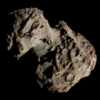| Discovery | |
|---|---|
| Discovered by | George P. Bond |
| Discovery site | Cambridge, Massachusetts |
| Discovery date | 30 August 1850 |
| Designations | |
| Alternative designations | 1850 II |
| Orbital characteristics | |
| Epoch | 19 October 1850 (JD 2397050.3374) |
| Observation arc | 76 days |
| Number of observations | 103 |
| Perihelion | 0.565 AU |
| Eccentricity | ~1.000 |
| Orbital period | ~46,000 years |
| Inclination | 40.062° |
| Longitude of ascending node | 208.11° |
| Argument of periapsis | 243.20° |
| Last perihelion | 19 October 1850 |
| Comet total magnitude (M1) | 7.9 |
Bond's Comet, formally known as C/1850 Q1, is a parabolic comet that was observed through telescopes throughout late 1850. It was the only comet discovered independently by American astronomer, George Phillips Bond.
Discovery and observations
The comet was discovered by George Phillips Bond as a "faint, telescopic object" in the constellation Camelopardalis, about 10° north of the star α Per on 29 August 1850. It gradually brightened during the first weeks of September 1850, allowing further observations of the comet to be conducted by various other observatories around the globe. On September 18, Richard Carrington noted that the comet is best seen with a Fraunhofer refractor. The comet reached perihelion on October 19, however the comet was difficult to observe at this time due to its low position in the twilight skies. It was last observed on 14 November 1850.
Initial orbital calculations in the 19th century showed the comet has a weakly-bound parabolic orbit with an orbital period of 46,000 years. Recalculations in 2003 suggested a hyperbolic trajectory instead, based on 103 observations of the comet.
References
- G. P. Bond (1851). "Observations on the comet of Aug. 29. 1850 made at the observatory of Harvard College Cambridge U. S.". Astronomische Nachrichten. 31 (1): 357–358. doi:10.1002/asna.18510312304.
- "Comet Names and Designations". International Comet Quarterly. Retrieved 18 December 2024.
- ^ R. L. Branham, Jr. (2003). "Orbit of Comet C/1850 Q1 (Bond)" (PDF). Publications of the Astronomical Society of Australia. 20 (2): 184–188. Bibcode:2003PASA...20..184B. doi:10.1071/AS02014.
- "C/1850 Q1 (Bond) – JPL Small-Body Database Lookup". ssd.jpl.nasa.gov. Jet Propulsion Laboratory. Retrieved 24 December 2024.
- ^ G. W. Kronk (2003). Cometography: A Catalog of Comets. Vol. 2: 1800–1899. Cambridge University Press. pp. 197–199. ISBN 978-0-521-58505-7.
- G. P. Bond (1850). "Account of Discovery of a Comet, August 29, 1850" (PDF). Monthly Notices of the Royal Astronomical Society. 11 (1): 12–14. Bibcode:1850MNRAS..11...12B. doi:10.1093/mnras/11.1.12.
- R. C. Carrington (1851). "Observations of Bond's Comet" (PDF). Monthly Notices of the Royal Astronomical Society. 11 (3): 63. Bibcode:1851MNRAS..11...63C. doi:10.1093/mnras/11.3.63a.
External links
- C/1850 Q1 at the JPL Small-Body Database
This comet-related article is a stub. You can help Misplaced Pages by expanding it. |

